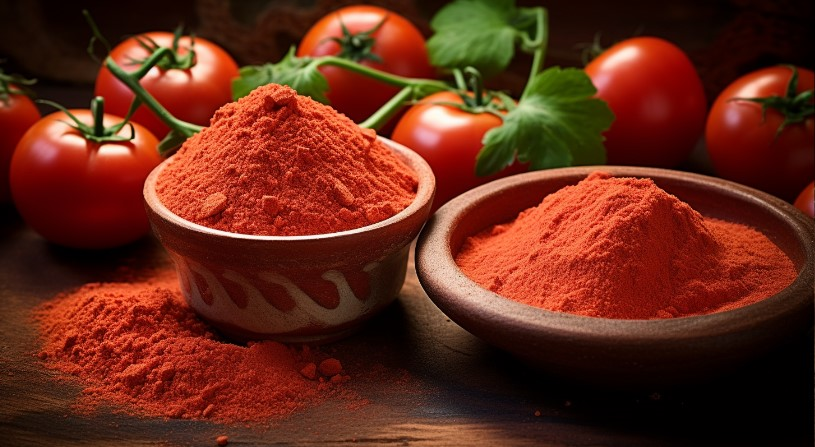Antioxidant star lycopene

With people’s attention to dietary health, lycopene is becoming more and more popular, in addition, it is also concerned about feed additives. The results showed that lycopene used in aquaculture can make aquatic animals colorful and improve their quality. Mixed with lutein to make carotenoid preparations, can prevent animal vitamin deficiency.
At present, the production of lycopene by microbial fermentation has a short production cycle, is not restricted by the site and season, and most of the raw materials used are cheap food crops, with low production cost, safety and non-toxic. With the deepening of research and the emergence of innovative products in various fields, lycopene has a good application prospect.
Introduction to lycopene
lycopene is widely found in tomatoes, tomato products, watermelon, grapefruit and other fruits, is the main pigment in ripe tomatoes, but also one of the common carotenoids.
In 1989, MASCIO discovered that lycopene had the highest quenching activity against singlet oxygen of all carotenoids.
Subsequently, the research on the function of lycopene has become a hot spot, including the absorption and metabolism of lycopene, the reduction of lycopene in prostate cancer and other tumors and the risk of cardiovascular diseases, as well as the extraction and determination of lycopene.
At present, lycopene has not only been widely used as a natural pigment, but also has been increasingly used in functional foods, drugs and cosmetics
Efficacy and function of lycopene
Antioxidant
Lycopene is a member of the carotenoid family of antioxidants that protect the body from damage caused by free radicals. When free radical levels exceed antioxidant levels, they create oxidative stress in the body, which is a major cause of many chronic diseases, such as cancer, diabetes, heart disease, and Alzheimer’s disease.
Studies have shown that the antioxidant properties of lycopene can help keep free radical levels in balance, protecting the body to reduce the risk of chronic disease, in addition, test tube and animal studies have shown that lycopene can help the body mitigate the damage caused by some toxic substances, such as pesticides, herbicides, etc.
Oral beauty
Lycopene is a very popular beauty raw material in recent years, its role in oral beauty is mainly manifested in two aspects, on the one hand, lycopene helps to reduce the damage caused by ultraviolet light on the skin, on the other hand, lycopene can promote the production of collagen, help maintain the elasticity of the skin, reduce wrinkles.
Lycopene can also improve skin allergies, eliminating dry skin and itching caused by skin allergies. However, lycopene’s protection against UV damage is limited and should not replace sunscreen.
Cardiovascular health
Lycopene may also help reduce the risk of heart disease, mainly because it reduces free radical damage, LDL cholesterol levels, and increases HDL cholesterol. And high levels of lycopene in the blood can add years to the lives of people with metabolic syndrome. The researchers noted that patients with metabolic diseases with the highest levels of lycopene in their blood had a 39 percent lower risk of premature death over a 10-year period.
Eye care
As a carotenoid, lycopene can effectively inhibit the role of lipid oxidation, prevent the destruction of free radicals, and inhibit retinal macular degeneration, prevent or delay the formation of cataracts.
Brain Health and bone health
Lycopene’s antioxidant properties may help prevent age-related memory loss, and may also slow the death of bone cells, strengthen bone structure and help keep bones healthy and strong. In a clinical study, lycopene was shown to affect bone metabolism (the continuous production and breakdown of bone tissue) and to alter the activity of multiple genes that support bone density, thereby providing bone strength.
Andy
